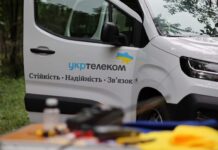A group of MPs has submitted to the Verkhovna Rada a draft law on amendments to certain legislative acts of Ukraine to improve certain provisions of the legislation in the field of electronic communications.
Draft Law No. 9463 provides for the possibility of conducting speed tests to improve the quality of communication, monitoring the speed of mobile Internet, and further extending the national roaming. This will improve the quality of communication across the country.
According to the authors of the draft law, it “was developed to improve the quality of mobile communications in rural areas, to monitor the fulfillment of license obligations by mobile operators to ensure coverage of 90% of the population with an average data transfer rate of at least 2 Mbps.” In addition, the legal provisions of the Law of Ukraine “On Electronic Communications” are in line with the legislation of the European Union and other Ukrainian legislative acts.
Extension of national roaming
Currently, there are 5529 settlements in Ukraine with only one mobile operator, which means that, according to the State Statistics Service, as of January 1, 2022, 1.5 million people have to rely on the absence or presence of coverage in their locality when choosing a mobile operator.
In order to ensure that people who have changed their place of residence and moved to settlements with only one operator do not lose the opportunity to use the services of their home operator after the end of martial law, it is necessary to introduce mandatory national roaming even after the end of martial law for settlements with less than 2,000 residents.
The changes will also ensure the availability of communication when traveling around the country, regardless of which operator the subscriber uses, if there is coverage of at least one mobile operator in the locality.

Challenges for communication
During the full-scale war, Ukraine faced unprecedented challenges for the telecom sector. Russia destroyed a quarter of Internet networks and damaged or destroyed more than 4,000 base stations of mobile operators. The team of the Ministry of Digital Transformation is constantly looking for solutions to quickly restore communication to the settlements. In particular, they provided the country with 42 thousand Starlinks and removed bureaucracy from the process of obtaining land for base stations.
This was stated by Deputy Prime Minister for Innovation, Education, Science and Technology Development, Minister of Digital Transformation Mykhailo Fedorov:
“The next step is the draft law No. 9463, which will bring mobile communications and the Internet in Ukraine to a qualitatively new level.”
Changes for subscribers after adoption
- National roaming is forever.
In wartime, it will allow them to call their loved ones and use 3G in places where their own operator does not have a connection. In particular, after de-occupation or during blackouts. After the victory, roaming will make it possible to always be connected to 4G in small villages with up to 2,000 people and coverage from at least one of the three operators. - Speed tests are the basis for checking and improving the quality of communication.
The draft law will allow everyone to do speed tests and report to the state where there are problems with communication. This will make it easier and faster to find “white spots” and encourage operators to improve communication. - Mobile Internet speed monitoring.
Speed will officially become one of the indicators of mobile communication quality. This way, the government will be able to check its level and influence its improvement. And Ukrainians will be able to communicate with colleagues from their smartphones, post videos on social media, or share files without Wi-Fi anywhere.
With the adoption of the draft law, conditions will be created to improve the quality of mobile communications throughout Ukraine, namely the quality of voice and data communications. It will also significantly improve mobile coverage in rural areas, leading to a reduction in the digital divide. The possibility of using public services online in rural areas will increase.









